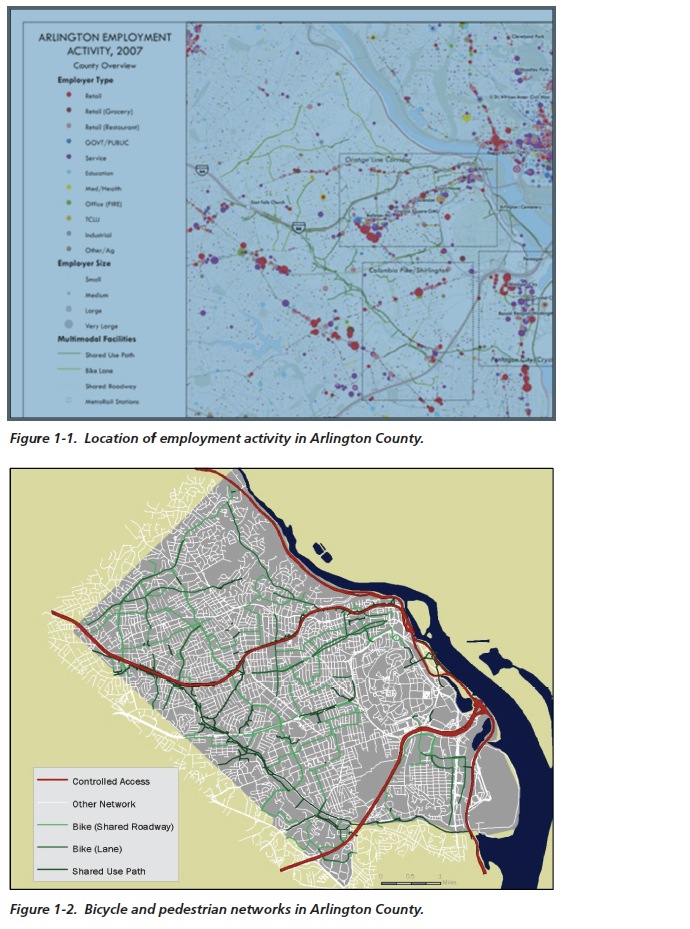
NATIONAL COOPERATIVE HIGHWAY RESEARCH PROGRAM
View this complete post...







John Hennessy III,
P.E.





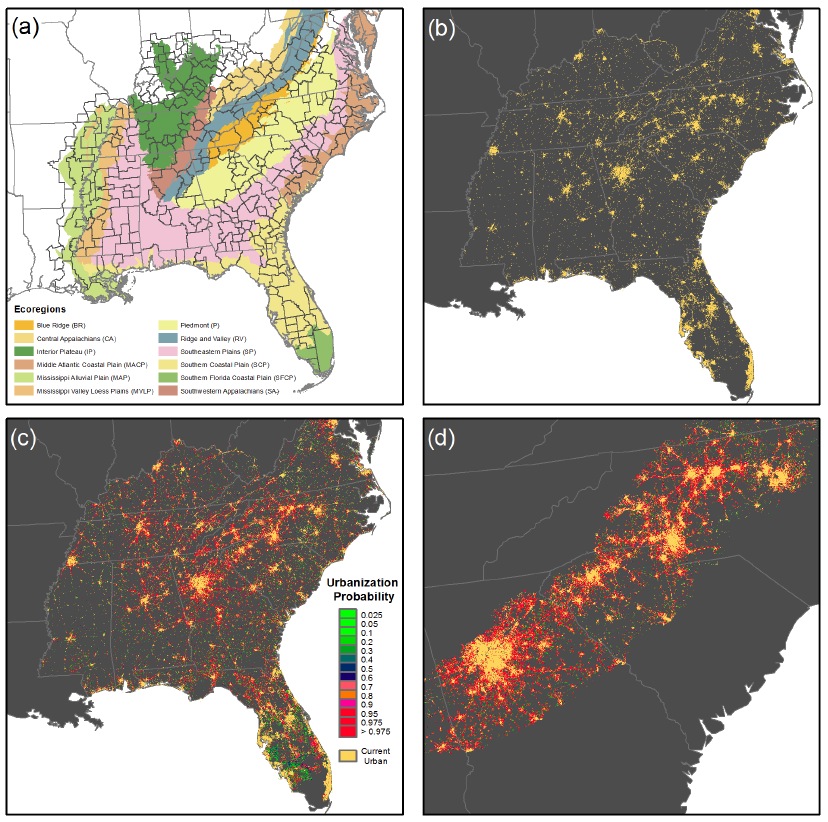
DEPARTMENT OF APPLIED ECOLOGY
NORTH CAROLINA STATE UNIVERSITY
Cities are expanding, and as they do urban sprawl–low-density urban development outside the urban core–is expanding even more rapidly. In some regions, expansion of suburban habitats as a result of shifts to automobile-dependent living has led to increases in the urban footprint even where populations have not shown large increases. Urban sprawl increases the connectivity among urban habitats while simultaneously fragmenting non-urban habitats such as forests and grasslands. These changes have a variety of effects on species and ecosystems, including impacts to water pollution, disturbance dynamics, local climate, and predator-prey relationships. Urban sprawl will also, almost certainly, influence the ability of species to respond to climate change, in as much as it creates barriers to the movement of species that cannot survive in cities and corridors for those who can. Knowledge about the potential future character of urban sprawl is thus useful to a variety of stakeholders, including resource managers, conservation organizations, and urban planners.
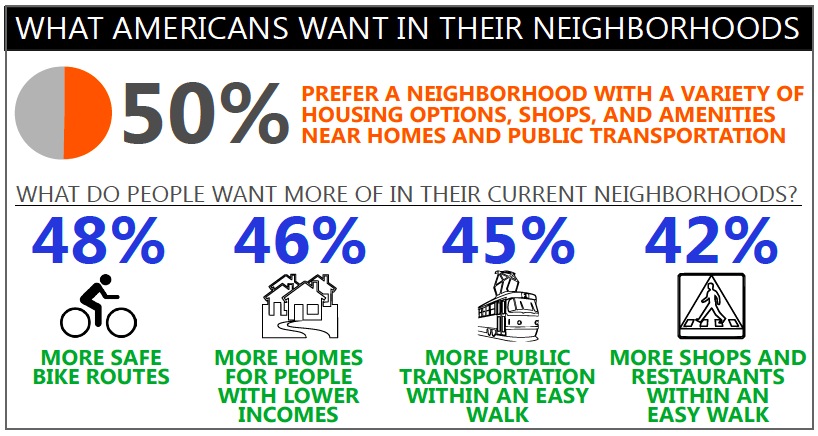
PARTNERSHIP FOR SUSTAINABLE COMMUNITIES
Many of our communities and housing options, built for a different time, are not what Americans want today. Research from the real estate industry shows that more people want to live in more convenient, walkable neighborhoods (Figure 1). A National Association of Realtors survey showed that half of Americans prefer a neighborhood with a variety of housing types, including multifamily and single-family homes; shops, restaurants, and amenities within walking distance; and nearby public transportation over a neighborhood with only single-family homes and few transportation options besides driving. Walkable communities are particularly important to millennials, who make up the largest percentage of the U.S. population; one research firm estimates that about 70 percent of them see walkability as “important” or “vital” when choosing a home.

CG/LA INFRASTRUCTURE
North America is currently experiencing the highest rate of urbanization in history. The way that infrastructure is developed in cities in the coming years is critical. The 2014 Strategic Top 100 highlights cities that are getting it right by making long-term investments into the right projects. These cities are shifting resources towards Transport- Oriented Development (TOD) and sustainable practices; exploring innovative methods of financing and value capture; while applying a keen understanding of public life and its importance to planning and design. Public sector leaders in the cities highlighted below are creating a sustainable vision for transportation that will benefit not only the local population, but also increased economic competitiveness in the region.

SASAKI
Urbanites across the country agree on a few things: they want great food, they love waterfronts, and they value historical architecture. As planners and designers, our job is to understand what people want and balance these desires with the big picture—economic realities, cultural needs, environmental concerns, and design opportunities—ultimately helping to shape a more satisfying and sustainable urban experience.
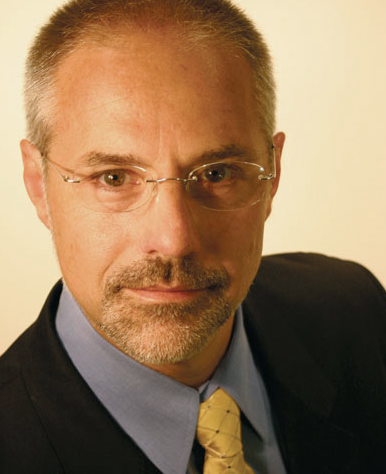
Terry D. Bennett, LS LPF MRICS ENV SP LEED AP, is the senior industry program manager and lead strategist for civil infrastructure at Autodesk. He is responsible for setting the company’s future vision and strategy for technology serving the planning, surveying, civil engineering and heavy construction industries, as well as cultivating and sustaining the firm’s relationships with strategic industry leaders and associations.
“…Many of the answers will be found by reconnecting the American people with the many economic, social, and even environmental aspects of infrastructure and its investment. Today’s challenge is really about renewing our vision for how to balance natural and man-made infrastructure, and how to leverage both to enhance our future condition…”
View this complete post...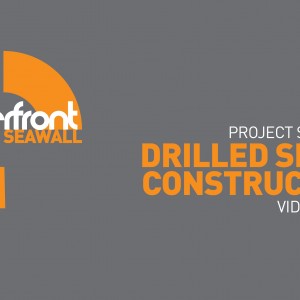
Concrete shafts provide additional structural support to certain sections of the new seawall. Watch as the Seawall Project team installs one of these drilled shafts south of Colman Dock.
For more information, visit http://www.waterfrontseattle.org/seawall
View this complete post...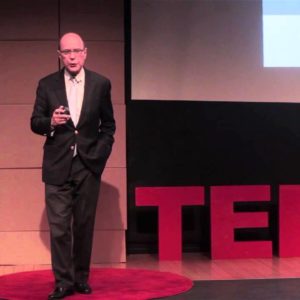
This talk was given at a local TEDx event, produced independently of the TED Conferences. In this talk he combined his knowledge and experience of infrastructure issues with his analytic skills to make a compelling argument for America’s policy makers to invest the right amount of funds for public infrastructure using the pothole as a metaphor for all infrastructure needs. He points out America’s lack of understanding of its infrastructure needs and its inattention to the work and wisdom of its engineers.
View this complete post...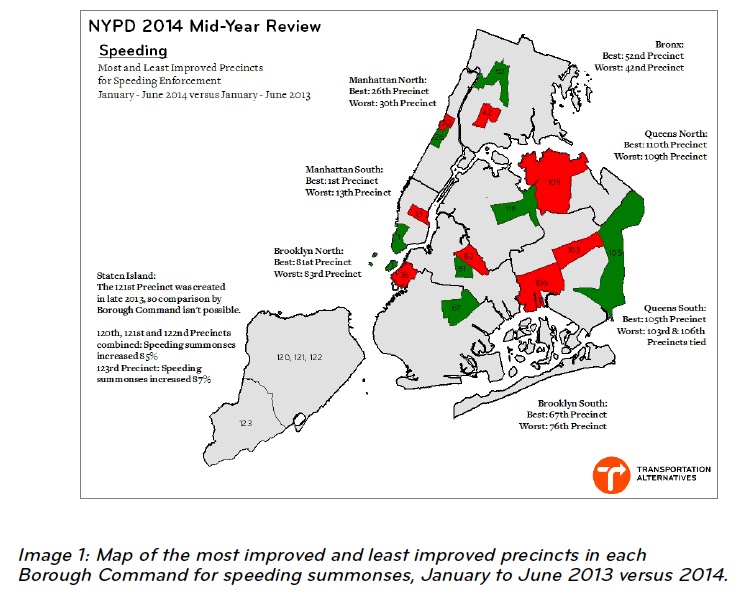
TRANSPORTATION ALTERNATIVES
Despite two decades of steady declines,traffic fatalities remain an epidemic in New York City. More people are killed in traffic than are murdered by guns;traffic crashes are the foremost cause of preventable death for New York City children and, after falls,the primary cause of injury-related death for older New Yorkers.
In February 2014, Mayor Bill de Blasio launched a Vision Zero initiative –with the goal of eliminating traffic fatalities and serious injuries in New York City by 2024 –which the New York Police Department embraced wholeheartedly, instructing all precinct commanders to increase enforcement of the most dangerous traffic violations.Increased enforcement remains a central element to achieving Mayor de Blasio’s Vision Zero goal.
View this complete post...Follow InfrastructureUSA
Video, stills and tales. Share images of the Infra in your community that demands attention. Post your ideas about national Infra issues. Go ahead. Show Us Your Infra! Upload and instantly share your message.
Is the administration moving fast enough on Infra issues? Are Americans prepared to pay more taxes for repairs? Should job creation be the guiding determination? Vote now!
What do the experts think? This is where the nation's public policy organizations, trade associations and think tanks weigh in with analysis on Infra issues. Tell them what you think. Ask questions. Share a different view.
The Infra Blog offers cutting edge perspective on a broad spectrum of Infra topics. Frequent updates and provocative posts highlight hot button topics -- essential ingredients of a national Infra dialogue.
It is encouraging to finally see clear signs of federal action to support a comprehensive US infrastructure investment plan.
Now more than ever, our advocacy is needed to keep stakeholders informed and connected, and to hold politicians to their promises to finally fix our nation’s ailing infrastructure.
We have already engaged nearly 280,000 users, and hoping to add many more as interest continues to grow.
We require your support in order to rise to this occasion, to make the most of this opportunity. Please consider making a tax-deductible donation to InfrastructureUSA.org.
Steve Anderson
Managing Director
SteveAnderson@InfrastructureUSA.org
917-940-7125